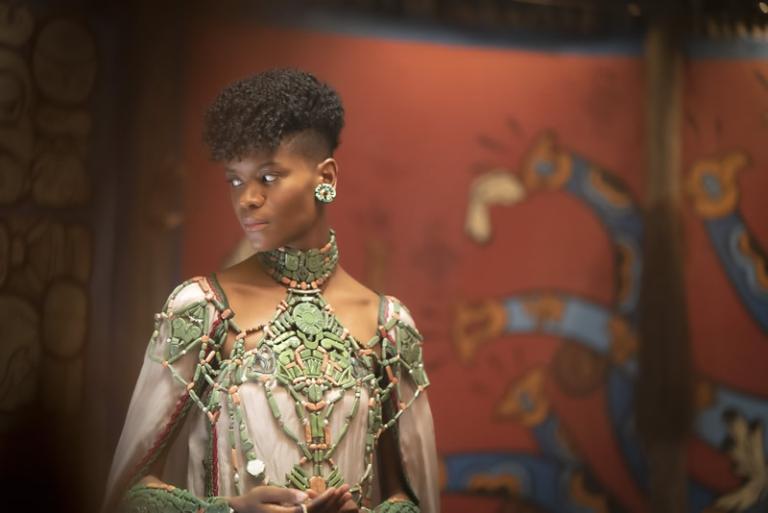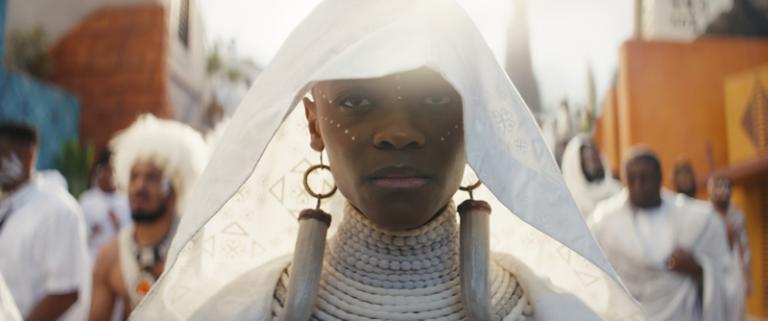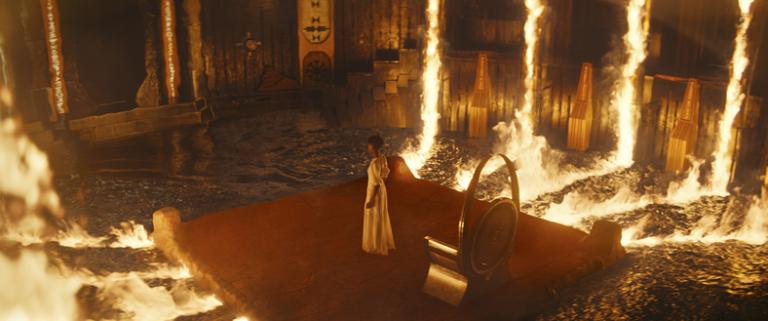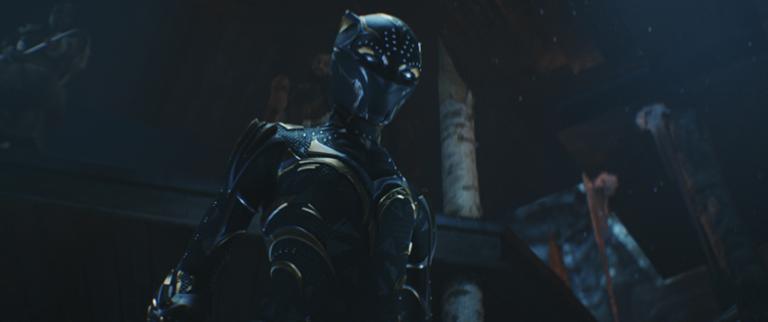
In superhero stories, death is often more of a temporary setback. Spider-Man was gone for five years after the events of Avengers: Infinity War and returned, no worse for wear. Doctor Strange died literally countless times in his first movie. Sure, Loki was killed with some permanence in Infinity War. But according to Disney+’s Loki, there are plenty more gods of mischief to be had.
That’s one thing that makes Black Panther: Wakanda Forever so unusual—and, in its own way, so powerful. Here—in part because of the tragic passing of Chadwick Boseman—death means something. Here, it cannot be just explained away.
And yet, because death shows up in its true guise, the loss and grief that surrounds it opens the door for strange new hope, and faith, and life.

Gone, But Not Forgotten
The movie begins with T’Challa—played in four movies by Boseman—dying. His sister Shuri prays to Wakanda’s national deity, Bast. As Shuri (played by Letitia Wright) works furiously to find a cure, she prays to Wakanda’s national deity, Bast. Cure my brother, she says, and I’ll never doubt your existence again.
The prayer fails. T’Challa dies, and Wakanda says goodbye to its king in a poignant, joyous ceremony.
A year later, Shuri and her mother, Queen Ramonda (Angela Bassett in a truly regal performance) take a walk. Ramonda explains that it’s tradition for grieving family members to burn their mourning clothes a year after someone’s passing, signaling a move into a new stage of grief and life. Shuri rejects this ceremony: Ramonda tries to impress upon Shuri that T’Challa may be dead, but he’s not truly gone. Indeed, she felt his presence at a very critical moment in her life.
“He wasn’t there, mother,” Shuri tells her mother. “The presence that you felt was just a construct of your mind.”
Whatever she believed before T’Challa’s death, Shuri believes in technology now. We are organic machines that run their course and cease to be. We have no immortal souls. We have no supernatural protectors. We’re on our own.
Moments later, the two of them face Namor, the king of an underwater realm that, like Wakanda, possesses stores of the versatile, priceless metal Vibranium.
Some would say that this is where Wakanda Forever truly begins—this meeting of global superpowers. The movie is about them, after all, and their differing strategies on how to deal with the rest of the Vibranium-hungry world.
But in some ways, that quiet scene between Ramonda and Shuri really sets the stage. Wakanda Forever pretends to be about Vibranium. In reality, it’s about an even more precious object: Shuri’s soul.

A God (and Grief) Shaped Hole
Throughout most of the movie, we see a sharp contrast between Ramonda’s deep faith and Shuri’s lack of it. Ramonda often talks about how, being Wakandan, she knows that death is not the end. Shuri believes otherwise. They love each other a lot, but Shuri can’t buy into her mother’s faith.
French mathematician and author Blaise Pascal wrote that there’s a “God-shaped vacuum in the heart of each man which cannot be satisfied by any created thing.” Grief, too, can leave a vacuum.
That’s a big deal in Wakanda Forever. Ramonda’s God-shaped hole is filled with what it should be: Faith. While Bast is the god that fills that technically fills that vacuum, we can see him as simply a stand-in for our uppercase-g God and all that He represents. And while the vacuum left behind by T’Challa’s passing is very real—we see her grief throughout the film—her faith spills into that hole, filling and healing it. Death is not the end. T’Challa goes on.
Shuri has no such assurance. And without faith to fill the vacuum left behind by her brother, something else begins to fill it: Rage. She admits to her mother that, if she didn’t throw herself into her work, she’d want to burn the world.
For much of the movie, she’s able to put that rage aside and concentrate on both doing what she must and what she should. She’s principled and kind—doing her best to save a nettlesome young scientist named Riri from those who’d want to kill her.
But when Shuri suffers another staggering tragedy, her anger and desire for revenge spills over—even as she tries to dam it up.
(Caution: We’ll be dealing with some spoilers from this point on.)

Bad Trip
Shuri eventually finds a way to resurrect the mysterious flower that imbued supernatural powers to its historical protectors (known throughout the generations as the Black Panther, and of which T’Challa was obviously the most recent). In ages past, the consuming of said flower (mixed into a potent broth) has been a partly religious ritual, where the new Black Panther spiritually visits another plane filled with his ancestors.
Shuri doesn’t believe in such a plane. She certainly doesn’t think that her ancestors can give her advice. When she submits to becoming Wakanda’s next Black Panther, she strips away most of its religious connotations. She drinks the brew in her lab, not as part of a public ceremony, and when she drinks the brew Shuri only allows the barest bits of spiritual tradition to come alongside.
She soon regrets it. She drinks the stuff and—much to her surprise—has a spiritual visitor. It’s not her brother, but her cousin, N’Jadaka/Killmonger. You know, the guy who took over the throne for a bit and almost threw the world into global catastrophe. Not exactly the person you want to meet in the afterlife, but it’s a pretty great indication of where her soul is at.
Killmonger tells Shuri that T’Challa was entirely too good. Desperate times (and these are indeed desperate times) require nastier leadership, he insists.
“Are you gonna be noble like your brother?” He asks her as flames rise around the pair. “Or take care of business—like me?”
As telling as the scene is, it’s equally telling that Shuri denies seeing anybody in a vision at all. She publicly rejects that these things are any more than a “construct of your mind.” And sure, perhaps that’s just what Killmonger is.
But real or no, that visit with Killmonger pushes Shuri down a darker path—one that ends with Shuri fighting Namor and determined to kill him. The showdown takes place on a beach littered with wreckage and licked with flame. It looks, honestly, just a little like hell—visually reflecting both what the future could hold and Shuri’s own soul right in that moment.
But then, in a critical moment, Shuri sees another vision.
“Show him who you are,” it says.
In that vision, Shuri finds a choice. Instead of denying the reality of the spiritual vision ever, she listens to it. Perhaps that God-shaped vacuum inside her finds a little filling. Instead of raging over her losses, she chooses to follow the examples of those she lost.

Moving On
Wakanda Forever is about loss and grief and, most importantly, grieving well. While the movie as a whole felt a bit overlong and overstuffed to me, it worked best on that ground-level emotion. It worked best when we saw Shuri deal with grief. She pushed it aside. She let it fill her with rage. It nearly destroyed her, in a way.
And that makes the movie’s end so deeply poignant. It ends not with bombast, but with Shuri sitting by a fire, quietly crying. Mourning. And knowing that while she’s lost people to death, they’re not gone. Not really.













